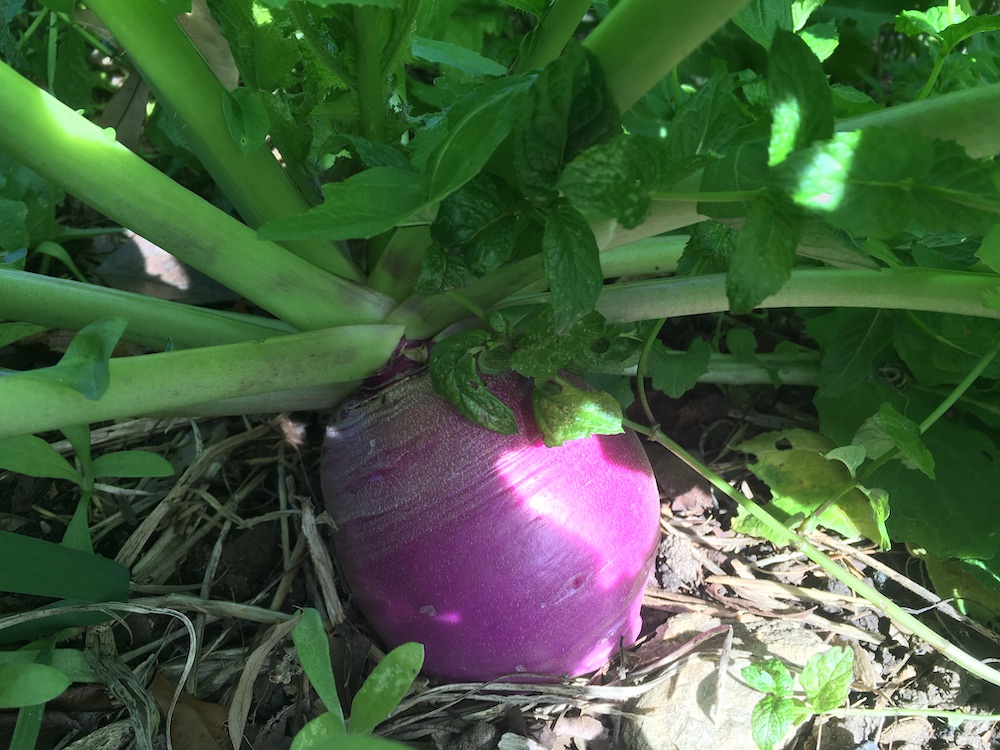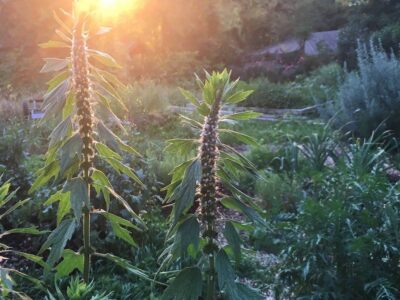
Make 2020 a year of new growth
Eliza Laubach | February 25, 2020 | No Comments

Turnips are a hardy root vegetable that can be grown in the spring and the fall. Photo by Eliza Laubach
When the daffodils flower and the trees bud new leaves, the urge to grow seeps like a seasonal spring replenished anew. Planting a garden connects one to the life force emerging all around, and brings blessings of food and beauty as the year goes on. Gardens were once a staple of rural mountain life, but they are no longer as common and starting one for the first time can be intimidating.
But the benefits are many. Growing food builds local resilience as the climate changes, and brings fresh food directly into communities. Appalachia contains many food deserts, which the U.S. Department of Agriculture defines as low-income areas where a substantial number of residents have little to no access to a supermarket.

Motherwort, a medicinal herb, blooms on a late may evening in the author’s garden. Photo by Eliza Laubach
“A lot of kids these days are so far removed from where their food comes from,” says Anderson.
She started a 4-H program, a hands-on youth group, in 2016 to connect with the community. Around six kids now grow food in raised beds on the extension office grounds and run a seasonal vegetable stand at the county farmers market. Inspired by the program, three of the members have started gardening at home.
Feeling ready to do the same?
1. Make a garden plan
A garden plan will provide direction and increase chances of success. Thoughtfully consider your garden’s location, so that it is integrated with other aspects of the homestead. Think about garden access, orientation to the sun, intention and future plans for the garden. The closer the garden to the house, the more it will be visited. Perennials can be planted farther away.
Some questions to consider for the plan:
2. Pick out your favorite vegetables and flowers
Grow what you love, and feel the enjoyment of seeing it prosper. Order a seed catalog from a local or regional heirloom seed company, such as Sow True Seed in Asheville, N.C., and pick out what is most alluring. Kale and radishes are great to start with, as they are hardy and grow quickly!
These companies stock heirloom seeds that are grown in the region, which are already in tune with the Appalachian climate. Heirloom vegetables have more nutrients and are better adapted to pests and diseases.
Flowers attract insects that pollinate your garden, and certain blooms, such as marigolds and chrysanthemums, act as deterrents for pests. Companion planting is an established method of planting certain vegetables and flowers together for optimum growing potential and pest protection.
Find out the plant hardiness zone and frost-free date for your region, and strategize accordingly. Seed catalogues are helpful guides. Make plans to start seeds or purchase vegetable starts, ideally from market farmers or local nurseries.
3. Connect with other gardeners and agricultural extension agents
Other gardeners will provide tips, community and helpful encouragement. Perhaps this is an opportunity to connect with your neighbor who has a flourishing garden, or join a club. Look up local social media gardening groups on Facebook or NextDoor. This is also a great way to get seeds directly from seed-savers!
Ask your extension agent if there is a seed library in your area, where gardeners can “check out” seeds grown by area seed-savers. Extension offices provide classes and educational material for gardeners and farmers. These are an invaluable, often free, resource with plentiful tips and tricks for home gardeners, and educational opportunities to scale up your garden to a farm if it takes root.
4. Get tools and get dirty!
For eradicating lawn turf, a square shovel and hula hoe are the most helpful, and most labor-intensive. A broadfork or strong pitchfork is a great way to loosen soil without tilling. If a rototiller is your choice, disturb the soil as little as possible. Always cover bare soil with straw (not hay!) or leaf mulch to sustain the life of microbes that live in the soil. If Bermuda grass is present, be diligent about pulling it out, as it resprouts and spreads very easily.
Soil is alive with microbes, and scientists have found that these bacteria act similar to serotonin, a mood-boosting hormone. So get dirt under your fingernails and feel the joy of gardening!
Interested in learning more? Organic Growers School in Western North Carolina hosts a spring and fall conference with a diverse array of classes on farming. You can also review this guide from the University of Kentucky Cooperative Extension Service and find planting schedules by state courtesy of Urban Farmer. Victory Seed Company also offers gardening resources for each state, and Sow True Seed offers crop-specific advice and seed-saving information.
Like this content? Subscribe to The Voice email digests